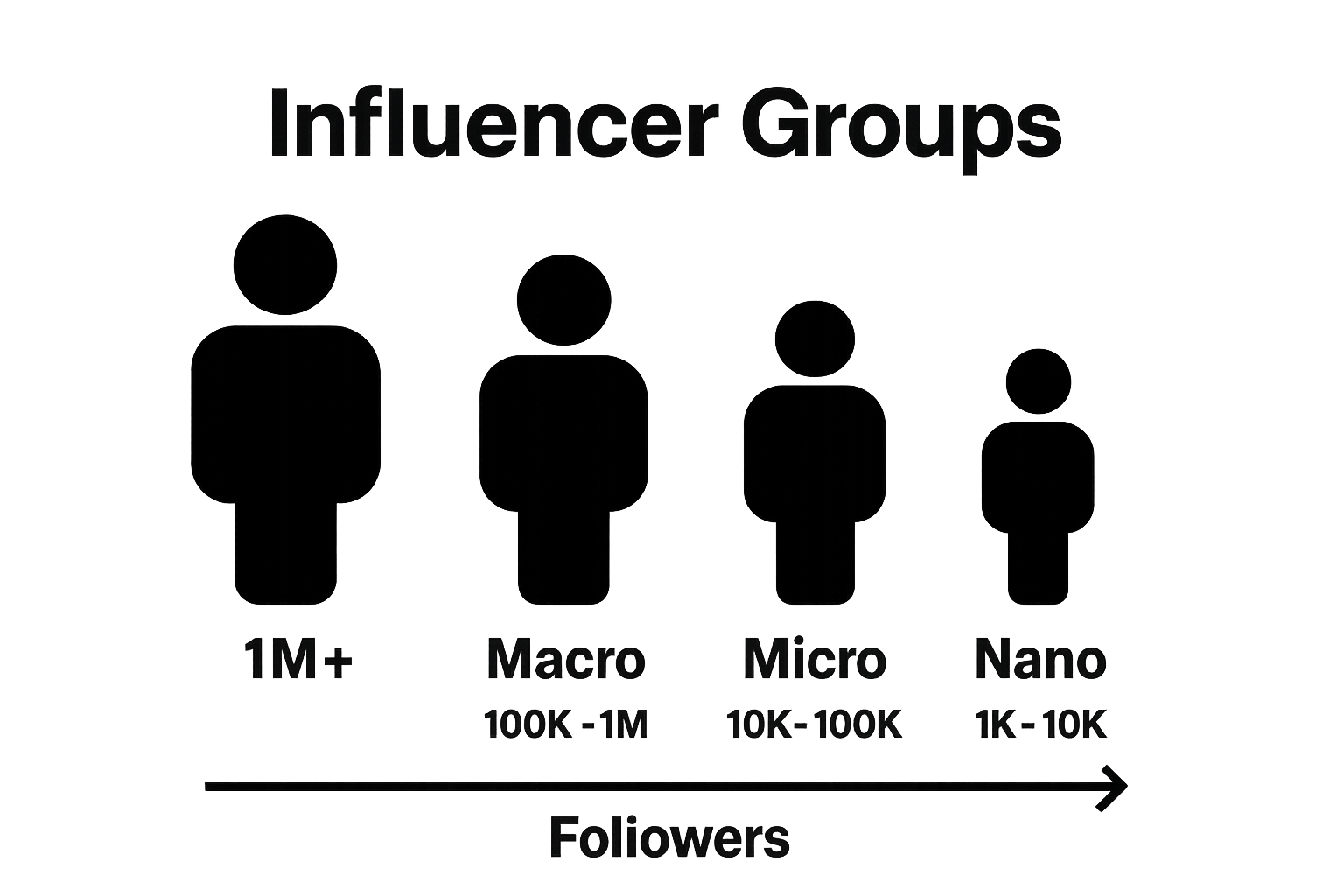Branding Elements That Drive Small Business Growth

Explore the influencer marketing framework for clear insights on effectiveness, strategies, and impactful applications in your business.

Influencer marketing has flipped the script on how brands connect with people. Nearly 40 percent of consumers now trust influencer recommendations as much as their own friends. Surprised? That trust comes from something deeper than flashy ads or follower counts. It is the authentic voice in someone’s feed that turns a simple shoutout into real influence.
Influencer marketing represents a strategic digital communication approach where brands collaborate with individuals who possess significant social media followership to promote products, services, or messages. Unlike traditional advertising, this method leverages personal connections and perceived authenticity to reach target audiences more effectively.
At its core, the influencer marketing framework involves several critical components that define its structure and effectiveness. Research from Old Dominion University highlights that influencers engage in complex collaborative practices that extend beyond simple product promotion.
Successful influencer marketing transcends mere product placement. According to the Library of Congress, influencers are strategically classified into distinct tiers:
These categories help brands select partners aligned with their marketing objectives, audience demographics, and budget constraints. The selection process involves analyzing not just follower count, but also audience engagement, content quality, and brand alignment.
The influencer marketing framework ultimately transforms traditional advertising by creating more personalized, trust-driven promotional strategies that resonate with modern consumers seeking authentic connections with brands.
The influencer marketing framework has emerged as a critical strategy for businesses seeking to navigate the complex digital communication landscape. As traditional advertising becomes increasingly less effective, companies are turning to more authentic and targeted approaches that resonate with modern consumers.
Research from the International Journal of Professional Business Review demonstrates that influencer marketing provides businesses with a powerful mechanism to achieve authentic engagement and precisely target desired audiences. The strategic value extends beyond simple product promotion, offering a nuanced approach to brand communication.
Key strategic advantages include:
Influencer marketing operates at the intersection of digital communication and consumer psychology. Our guide on brand messaging explores how personal recommendations significantly impact consumer decision making.
The psychological mechanisms driving influencer marketing effectiveness include:
Businesses that understand and strategically implement the influencer marketing framework can transform their communication approach, moving from interruption based marketing to connection based engagement that genuinely resonates with target audiences.
Influencer marketing operates through a sophisticated ecosystem of digital communication, collaboration, and strategic content creation. Understanding its underlying mechanics requires examining the intricate interactions between brands, influencers, and their audiences.
Research from digital marketing frameworks reveals that successful influencer marketing hinges on transparent and authentic endorsements. The process involves carefully designed collaborative strategies where brands and influencers co-create content that feels genuine and resonates with target audiences.
Key stages of content collaboration include:
Influencer marketing transcends traditional metrics by focusing on meaningful audience interactions. Learn more about increasing brand visibility through strategic digital communication approaches that prioritize engagement over simple reach.
Critical performance indicators encompass:
The mechanics of influencer marketing represent a dynamic intersection of digital communication, personal branding, and strategic marketing. By understanding these nuanced interactions, businesses can develop more authentic, targeted, and effective promotional strategies that genuinely connect with modern consumers.
Influencer marketing encompasses a diverse ecosystem of content creators with varying audience sizes, specializations, and engagement capabilities. Understanding these different influencer types is crucial for developing targeted and effective marketing strategies.
Research exploring social media influencer categories reveals a sophisticated classification system that goes beyond simple follower counts. Brands can strategically select influencers based on their specific marketing objectives, audience demographics, and content authenticity.
Key influencer categories include:

Learn more about our brand strategy approach that helps businesses navigate the complex influencer landscape. Each influencer type brings unique strengths to marketing campaigns, offering different levels of reach, engagement, and audience trust.
Important strategic considerations include:
By understanding the nuanced roles of various influencer types, businesses can craft more precise, targeted marketing strategies that resonate with specific audience segments and drive meaningful business outcomes.
Below is a breakdown of influencer types, highlighting their follower size, typical content focus, and the strategic benefits they offer brands.
Influencer TypeFollower RangeTypical Content FocusStrategic BenefitMega-InfluencerOver 1 millionMainstream, broad appealMaximum reach and rapid awarenessMacro-Influencer100,000 - 1 millionTopic-focused, professionalSignificant reach with credibilityMicro-Influencer10,000 - 100,000Niche expertise, communityHigh engagement, targeted audienceNano-Influencer1,000 - 10,000Hyper-niche, personalStrong trust, grassroots advocacy

Measuring the effectiveness of influencer marketing requires a comprehensive approach that goes beyond traditional advertising metrics. Businesses must develop sophisticated evaluation strategies that capture the nuanced impact of influencer collaborations.
Research from Social Media + Society reveals that professional marketers rely on multiple indicators to assess influencer marketing campaign success. The evaluation process involves analyzing both numerical data and qualitative engagement signals.
Key quantitative performance indicators include:
Explore our comprehensive marketing strategies that help businesses move beyond simple numerical analysis. Successful influencer marketing measurement requires understanding deeper psychological and brand perception metrics.
Critical qualitative evaluation factors encompass:
By integrating both quantitative and qualitative metrics, businesses can develop a holistic understanding of influencer marketing campaign performance, enabling more strategic and informed decision making in future collaborations.
The table below summarizes key quantitative and qualitative metrics for evaluating influencer marketing campaigns, clarifying what each measures and why it is important.
Metric TypeExample MetricWhat It MeasuresWhy It MattersQuantitativeReach and ImpressionsNumber of people exposed to influencer contentCampaign potential and awarenessQuantitativeEngagement RateLikes, comments, shares per postDepth of audience interactionQuantitativeConversion TrackingSales or actions directly linked to contentDirect business impactQuantitativeReturn on Investment (ROI)Revenue vs. marketing spendFinancial efficiencyQualitativeSentiment AnalysisEmotional tone of audience commentsBrand perception and goodwillQualitativeAudience Trust DevelopmentFollower trust built via recommendationsLong-term brand loyaltyQualitativeNarrative AlignmentConsistency with brand messagingAuthenticity and message integrity
Understanding the influencer marketing framework is only the first step. If you have struggled with scattered strategies, wasted budgets, or campaigns that fall flat, you know how overwhelming it feels to connect with the right audience and measure what actually works. Building authentic partnerships and using strategic indicators like engagement and trust are critical for real business growth—yet too often, small businesses miss out on meaningful impact because their marketing lacks a clear direction.

Cut through the noise and make your influencer marketing truly work for you. Discover how our proprietary Aligned Impact Model™ at Reasonate Studio transforms complex concepts like brand values, audience psychology, and content alignment into a system that actually delivers measurable results. Ready to attract better collaborations, maximize your budget, and take your brand to the next level? Start here for expert guidance that is practical, empathetic, and built for entrepreneurs who want to scale with clarity.
Influencer marketing is a strategic approach where brands collaborate with individuals who have a substantial social media following to promote products or messages, leveraging personal connections and authenticity for effective audience engagement.
Influencers are categorized into tiers based on their follower count: mega-influencers (over 1 million), macro-influencers (100,000 to 1 million), micro-influencers (1,000 to 100,000), and nano-influencers (less than 1,000). This classification helps brands select suitable partners aligned with their objectives.
Key advantages include enhanced audience targeting, cost-effective reach compared to traditional advertising, and increased credibility and trust through authentic endorsements.
Businesses can measure effectiveness through quantitative metrics like reach, engagement rates, and conversion tracking, as well as qualitative factors such as sentiment analysis and shifts in brand perception.